- Home
- Franklin W. Dixon
The Clue in the Embers Page 9
The Clue in the Embers Read online
Page 9
“And it’s mine!” Tony moaned. “It had all my clothes in it.”
“Couldn’t we go back and get it?” Chet asked. But Frank pointed out that they could never make it in time to catch the Central American flight.
“What’ll I do?” Tony asked woefully.
“You’ll just have to dress like an Indian!” Joe laughed.
“That might be a smart thing to do,” Frank said. “In Indian dress, with his black hair and dark skin, Tony might pass for a native guide.”
“Sure,” Tony agreed. “I might be able to learn things the rest of you couldn’t that would help us in our search. Only trouble is”—he sighed—“I can’t speak any Spanish or Indian dialect.”
Frank grinned and Joe said, “Oh, you can act like an antisocial type and say nothing.”
The boys boarded the plane. Presently a stewardess came around with magazines and Tony asked whether she had any literature on Guatemala. The pleasant young woman brought him a book in which he was soon absorbed.
As the plane took off and the other boys stared out the windows at the ground below, Tony discovered an item of interest in the Guatemalan book. It concerned an eccentric type of Indian, who rarely spoke and roamed the countryside looking for the sacred quetzal bird. “This would make a perfect disguise for me,” thought Tony. In another chapter, he studied and memorized some simple, useful words common to all Indians.
Then, excited by the prospect of playing the role of a native, he showed the book to his friends. Tony flipped to a page where a picture of the quetzal bird was shown. About the size of a turtle-dove, it was emerald green in color, with a shining crown containing ruby-red and blue tints.
“Listen to this! The bird cannot live in captivity, and is loved by the people for its free, wild, independent spirit. Because of this, the rare quetzal bird has become the national symbol of Guatemala.”
The jetliner winged its way down the coast and the four boys finally dozed. They slept through the night. At sunup they were over the Caribbean, nearing the eastern coast of Guatemala.
“There’s the shoreline!” Joe cried. The boys noticed that the vivid blue sea water was changing to a lighter hue and caught a glimpse of the white strip of beach and the mountains beyond.
At the Guatemala City airport, the boys were cleared through customs. They collected their bags, then went outside to look for a taxi. A driver approached and introduced himself as Jorge Almeida.
Smiling broadly as he picked up two bags, Almeida said, “This way, amigos. I have a fine taxi waiting for you!”
Grinning, they followed his slender but wiry figure to an old car parked by the curb. The driver put their bags in the trunk and the boys got inside.
“Better take us to a hotel first—some place where they have good food,” Frank directed.
“Hokay!” Jorge Almeida replied.
As he drove, the man chatted amiably and answered the boys’ questions. He told them he knew of no place near Guatemala City named Texichapi. “But,” he admitted modestly, “I have not been everywhere.”
Jorge pointed out the sights of the plaza, and drove them around the big square and past the arcades where natives sold food from small booths.
In the center of the plaza, men were arranging chairs on a bandstand in preparation for the evening’s concert, Jorge informed his passengers. Gaily dressed pedestrians were strolling along the promenades, admiring the beds of gorgeous, bright-colored flowers.
“Look at those men!” Joe exclaimed.
A group of small-statured Indians in red serapes, shawl-like blankets thrown over their shoulders, sat crouched in the shade of the arcades. “Tony, that’s what you’ll look like in your new clothes!”
Tony grunted. “Sí, me search for quetzal bird!”
The others grinned at his odd combination of Spanish and American-Indian dialect.
“Everybody like that bird.” Jorge laughed as he circled the square and finally stopped at the entrance of a clean, whitewashed hotel near the end of the plaza. “This place hokay!” he announced, unloading the baggage.
Frank added a generous tip to the taxi fare and Jorge said, “You fine boys! I drive you cheap from now on.”
The boys thanked Jorge for his offer, obtained his address, and promised to get in touch with him when they were ready for another ride.
After checking into the hotel and stowing their gear in two airy bedrooms, they set out to learn what they could about the road to Texichapi.
“Look!” Chet exclaimed, pointing out a booth near the square where native dishes were displayed. “I’m going to get some tortillas.”
The others agreed to wait for him. They sat down on a park bench as Chet walked over to the booth. Nearby, two men were playing marimbas and singing in low-pitched voices. Joe, Frank, and Tony were enjoying the music when a few minutes later Chet came running toward them, crying, “I’m on firel Get me water!”
He was fanning his tongue with his hand and the others realized that he had probably eaten a red-hot chili pepper. Tony pointed to a small drinking fountain nearby and said, “Use that!”
Chet dashed to the fountain and stuck his head into the spray. Grimacing with the burning sensation in his mouth, he then opened it wide, keeping his face under the jetting arcs of water.
“He probably thought he was eating a tomato,” said Joe.
Their friend finally left the fountain and walked toward them. Looking at the boys accusingly, Chet said, “I saw you all laughing but it was no joke.”
As he mopped his dripping wet hair with a handkerchief, the others apologized.
“We’ll test the food first after this,” said Joe. “Don’t forget that down here they like it highly spiced.”
The boys then continued walking around the promenade. At the side opposite the hotel, Joe spotted a shop that sold Indian goods. “Let’s go in and find a traveling outfit for Tony,” he suggested.
While Tony was buying wool trousers, a warm jacket, and a sute to wrap around his head, the others admired serapes, moccasins, and embroidered shirts. Finally Tony’s costume, including a shoulder-length wig, was wrapped and the group returned to the hotel.
Half an hour later the quartet appeared on the plaza. Tony made an odd-looking companion in his Indian clothes and wig.
“Now, I’m ready for the quetzal bird!” he said, laughing.
A Ladino, standing nearby, stared darkly at Tony and spat on the ground. Then he savagely spoke a Spanish phrase that Frank understood to mean:
“A curse on you!”
As the boys hurried away, Chet said fearfully, “You might get us all in trouble, Tony, pretending to be hunting for their sacred bird.”
“I won’t mention it again,” Tony promised. “In fact,” he smirked, “me silent, serious Indian. Your guide.”
After eating lunch in a nearby restaurant Jorge had recommended, the boys hunted up Mr. Putnam’s friend. To their disappointment, he had gone to Brazil.
“We’ll just have to inquire where Texichapi is,” said Frank.
But when they did, the various men shook their heads. No one had ever heard of it. A few knew where the Kulkuls lived—in a northwesterly direction from the city, but were vague as to any details about them.
“I guess that we’ll have to map out a route to
the Kulkul area and take a chance that the Indians will tell us where Texichapi is,” Frank concluded.
He bought a map and the boys pored over it until late that night. A route was finally decided upon.
“We can go one hundred miles to this point in a car,” Joe pointed out. “After that, we’ll have to hire mules.”
“We’d better let Dad know how we’re making out,” suggested Frank, and sent an airmail letter.
The next morning the hotel clerk directed them to a food supply store. Here they purchased a quantity of canned goods and bread. In the course of their conversation with the shopkeeper, he remarked that he had a relative at the one-hundred-mile point who rented mules, sa
ddles, and blankets to tourists who wanted to explore the mountainous country.
They went to Jorge’s house to make arrangements for him to drive them. His face became one expansive smile when he was given the assignment. As the boys walked back to the hotel, Joe remarked, “Doesn’t it seem queer to you that we haven’t been followed or bothered by our enemies?”
“How about the one who cursed Tony?” Chet asked.
“I don’t think he was part of any gang,” Joe replied. “He probably was one of those people who are superstitious about the quetzal bird and thought Tony was making fun of it.”
“Don’t forget,” said Frank, “that we don’t know who all our enemies are. We may meet more of them yet. I suggest that we leave here early tomorrow morning before anyone’s up.”
By phone they completed arrangements with Jorge, and soon after sunrise he was at the hotel entrance. The clothing the boys were not taking was checked at the hotel, and they set off in rough, warm mountain apparel. Tony, in his Indian costume, stowed the two duffel bags in the taxi.
“You turn Indian?” Jorge grinned. “Almost fool me,” he added.
“Good,” said Tony. “But I don’t know how to manage this blanket!” He grabbed his serape as it started to slip off his shoulders. Jorge explained how Tony should secure it. Then the boys climbed into the car and started their exciting journey to look for the Texichapi treasure.
In high spirits, Jorge sang a witty native tune as the road began to climb into the mountainous country. “Now we make with the speed!” he announced, driving like a daredevil around a sharp turn.
The boys’ hair was standing on end as the car screeched around another narrow bend, where the valley dropped away a thousand feet below.
“What’s the matter?” Jorge asked.
“Please take it easy!” Chet moaned. His friends also thought this would be a good idea.
“Hokay,” Almeida replied. “Soon the road—she gets more steep and like a snake.”
Just then a great roaring sound rumbled through the mountains. “What’s that?” Tony cried out.
“Volcano, I think,” Jorge replied, concern on his face. “We see.”
As the car completed the next sharp turn, the boys gasped. The mountaintop above them was exploding in a giant fountain of liquid fire! The boiling 2000-degree lava was already pouring down the slope. In a few minutes it would reach the road!
“We’re trapped!” cried Chet.
“No, no, we have ten minutes,” said Jorge. “We beat it!”
He raced the car along the road, but had gone only a hundred yards when there was another ominous rumble. Then, almost directly in front of the boys, a stream of lava came down.
“We’re lost!” cried Tony, as the lava spray came within a few feet of the car.
“I get out!” Jorge cried. “Beat other fire river before it run across road.”
He turned the taxi back along the treacherous roadway. Sweat poured down his face as he steered the swaying car.
“We’ll never make it!” Chet groaned.
CHAPTER XVI
A Kidnapped Companion
JORGE Almeida worked desperately to bring his taxi past the danger area. It swayed and skidded. But Jorge did not slow down as he headed for the serpentlike turn.
“Faster! Faster!” urged Chet, eyeing the hundred-foot-wide, red-hot lava flow above them.
It was so close that the boys could feel the intense heat from it.
With another burst of speed the taxi shot around the turn. Too late the boys saw that the road was blocked by several massive rocks that had rolled down the mountainside.
“We’ll crack up!” Tony yelled.
Jorge braked the car and succeeded in slowing it. But not enough. The taxi smashed into the boulders, throwing the boys violently forward.
All were dazed, but managed to climb out of the car. Jorge, who was stunned, was pulled out by Joe and Frank. The trio scrambled over the boulders, following Tony and Chet in their desperate flight to get as far away as possible from the path of the lava. Seconds later, the destructive stream gushed over Jorge’s wrecked car, carrying the taxi with it to the valley below.
“Whew!” sighed Joe, when they stopped running and looked back at the fiery spectacle. “Boy, that was a close call!”
“Thank goodness we’re all safe!” said Frank.
“All but my little taxi,” said Jorge. Then suddenly his face brightened. “It’s hokay! We got insurance. I will get new taxi from the company,” he said, “with louder horn.”
“But what’ll we do?” asked Chet. “We’ve lost our supplies and equipment. All that food,” he moaned.
“We get more!” Jorge said cheerfully.
But the boys did not share his lightheartedness. They were miles from any city or town and now had no means of transportation.
“My cousin Alvero Montero owns finca,” Jorge said. “It is long distance but we can walk it easily. He has mules we can borrow.”
The boys gladly accepted the offer and followed Jorge down the mountainside. For the remainder of the day, they trekked through the thick undergrowth of the valley.
Shortly before dusk, the group arrived at the charming Montero plantation. Work had ended for the day, and as the boys approached, the aroma of cooking reached them.
A tall, pleasant-looking man, dressed in work clothes, appeared at the front of the main house.
“My cousin,” said Jorge, and hooted a signal to his relative.
Montero waved and hurried to meet his unexpected guests. “Welcome, Jorge!” he cried in Spanish. “You bring friends? Good. You are all just in time to take dinner with us.”
Then, as the group came closer, he noticed their disheveled condition. “You have been in a battle with rebels?” he continued. “And what are you doing on foot? Where is your taxi, Jorge?”
Almeida introduced the boys and told his cousin of the near tragedy. After expressing his sympathy, the planter looked in amusement at Tony’s disguise. “You had me fooled.” Montero laughed. “And I see Indians every day. They work here.”
He invited the group inside and presented the boys to his beautiful Spanish wife and their two small sons. Their host provided the visitors with swimming trunks, and they swam in the cold, clear mountain water of a dammed-up stream near the house. Later, they sat down to eat a lavish steak dinner.
The hungry boys had never tasted a better meal, especially the dessert—bowls piled high with papayas and pineapples.
After dinner Senor Mr. Montero, smoking a slender black cigar, told them that he had not heard of Texichapi. But he would be glad to lend them four mules to take them to the point where they planned to rent animals and equipment for the rest of their trip.
“If anyone in Guatemala knows about Texichapi,” Montero continued, “it will be a remarkable old Indian who lives in a village across the next mountain.”
“Will he talk to us?” Frank asked.
“Yes,” Montero replied. “His name is Tecum-Uman. Tell him I sent you—he knows me well.”
Jorge arranged with his cousin to let the travelers stay overnight and they all slept soundly. Early in the morning he excused himself, saying he would go back to Guatemala City on one of Alvero’s mules and report the loss of his car to the taxi company.
The Hardys and their friends prepared to start for the village where Tecum-Uman lived. Señor Montero gave them a supply of food and handed each boy a machete. “With this, you can chop your way through the thickets.”
After thanking the planter for all the favors he had shown them and saying good-by to his family, the boys mounted their animals. Senor Montero said that the mules could be left at the place where they would pick up the others. Two of his workers would bring them back later.
With Tony still wearing the Indian outfit, the quartet began their arduous ride. Because the road was blocked off, they were forced to take a path through the dense forest of the valley.
“I wish we had a guide
with us,” Chet remarked.
“What do we need a guide for,” Joe asked, “when we have Big Chief Tony? He will lead us to Tecum-Uman.”
“Si, we no get lost, amigos,” Tony said with a stony face. “Only trouble is, wig itches!” He scratched his head and laughed.
The talk shifted to the treasure.
“What do you think it is?” Chet asked.
Frank said, “I’ve read that when Cortez’s captain, Alvarado, conquered this country over four hundred years ago, he reported that the Indians had great quantities of gold and precious jewels. Some of this treasure was buried by earthquakes, fioods, and volcanic eruptions, and people have been searching for it ever since.”
“Don’t get your hopes too high,” said Joe. “You may end up with some worthless three-eyed stone monsters.”
Several times along the way the quartet overtook small groups of homeless refugees whose houses and land had been devastated by the same volcano which nearly cost the boys their lives. The elderly people and children were riding burros, but the middle-aged group trudged along on foot, carrying their salvaged goods on the three-foot-high cacaxtles strapped to their heads and shoulders with cowhide thongs.
Each time the boys met these groups, Tony tried out his dialect, asking the people about the location of Texichapi. To his delight, they understood him and seemed to accept him as a member of some other tribe, but the boys were disappointed not to learn anything about Texichapi.
Traveling at a brisker pace than the heavily laden people, they quickly moved out ahead of the refugees. In midafternoon, as they approached the Indian village where Jorge’s cousin thought Tecum-Uman might live, the four riders came upon another group of natives on the narrow trail. Tony prepared to try out his disguise once again.
As the group rode up, the mounted Indians suddenly spotted Tony and cried frantically, “Shaman! Shaman!”
They made a quick flanking movement and encircled the stunned boys. Before Tony could even open his mouth, the attackers had grabbed him, pulled him onto a horse ridden by the fiercest-looking of the lot, and galloped off.
“They’ve kidnapped him!” Chet cried out.

 The Great Pumpkin Smash
The Great Pumpkin Smash Who Let the Frogs Out?
Who Let the Frogs Out?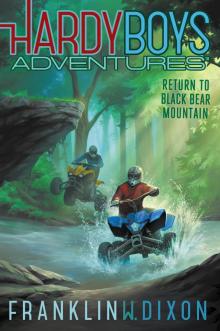 Return to Black Bear Mountain
Return to Black Bear Mountain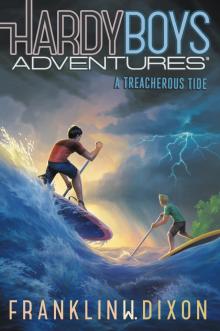 A Treacherous Tide
A Treacherous Tide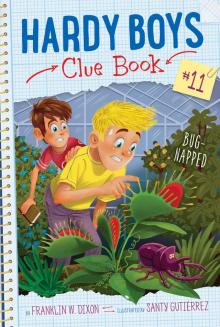 Bug-Napped
Bug-Napped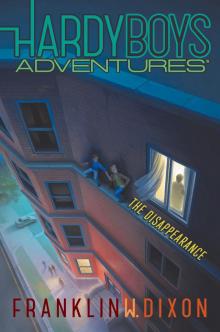 The Disappearance
The Disappearance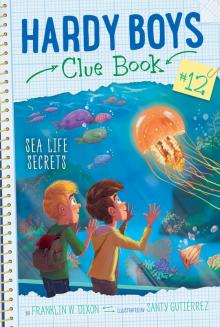 Sea Life Secrets
Sea Life Secrets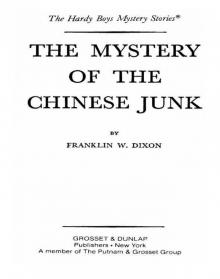 The Mystery of the Chinese Junk
The Mystery of the Chinese Junk A Skateboard Cat-astrophe
A Skateboard Cat-astrophe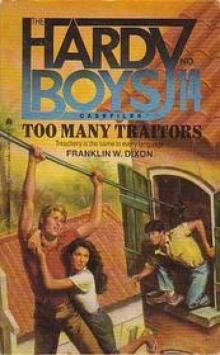 Too Many Traitors
Too Many Traitors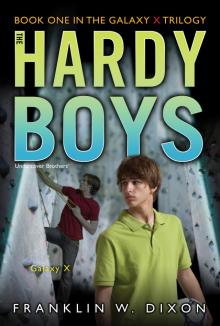 Galaxy X
Galaxy X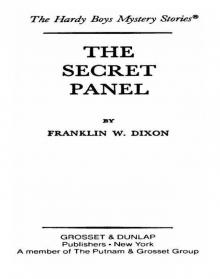 The Secret Panel
The Secret Panel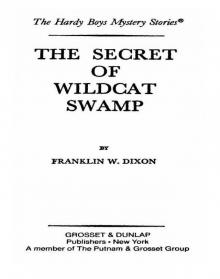 The Secret of Wildcat Swamp
The Secret of Wildcat Swamp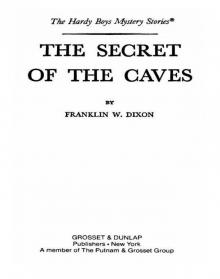 The Secret of the Caves
The Secret of the Caves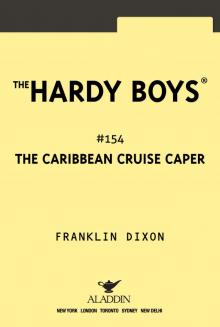 The Caribbean Cruise Caper
The Caribbean Cruise Caper Without a Trace
Without a Trace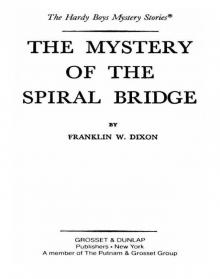 The Mystery of the Spiral Bridge
The Mystery of the Spiral Bridge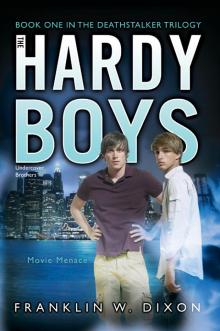 Movie Menace
Movie Menace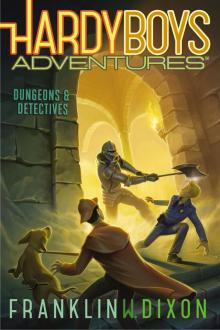 Dungeons & Detectives
Dungeons & Detectives Water-Ski Wipeout
Water-Ski Wipeout The Case of the Psychic's Vision
The Case of the Psychic's Vision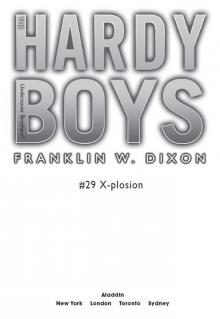 X-plosion
X-plosion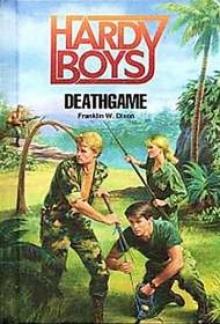 Deathgame
Deathgame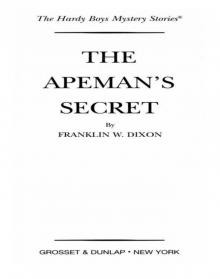 The Apeman's Secret
The Apeman's Secret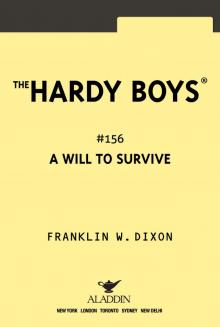 A Will to Survive
A Will to Survive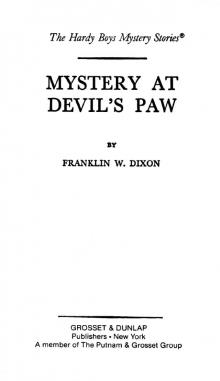 Mystery at Devil's Paw
Mystery at Devil's Paw Blood Money
Blood Money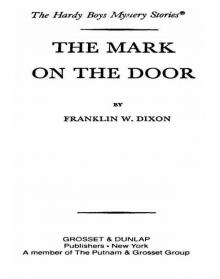 The Mark on the Door
The Mark on the Door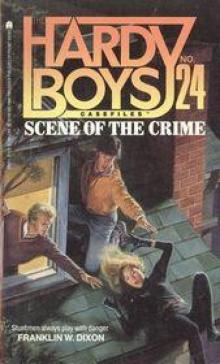 Scene of the Crime
Scene of the Crime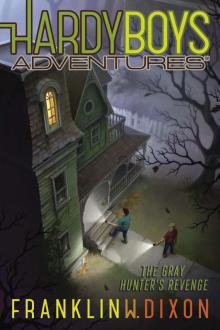 The Gray Hunter's Revenge
The Gray Hunter's Revenge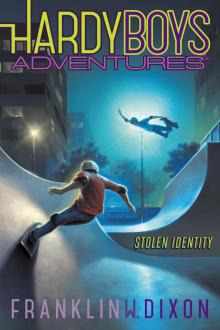 Stolen Identity
Stolen Identity The Mummy's Curse
The Mummy's Curse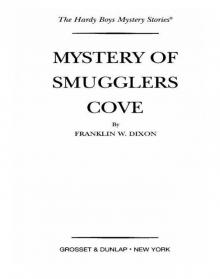 Mystery of Smugglers Cove
Mystery of Smugglers Cove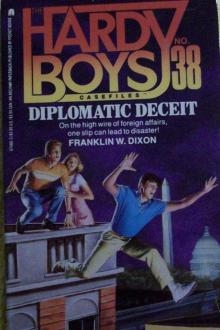 Diplomatic Deceit
Diplomatic Deceit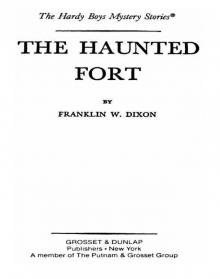 The Haunted Fort
The Haunted Fort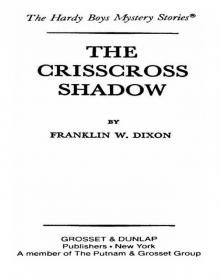 The Crisscross Shadow
The Crisscross Shadow Secret of the Red Arrow
Secret of the Red Arrow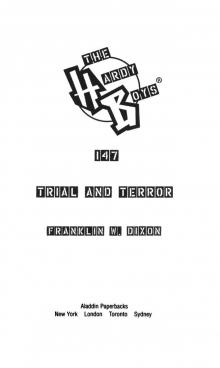 Trial and Terror
Trial and Terror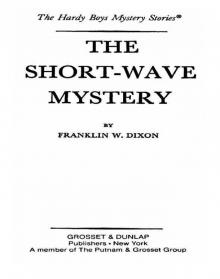 The Short-Wave Mystery
The Short-Wave Mystery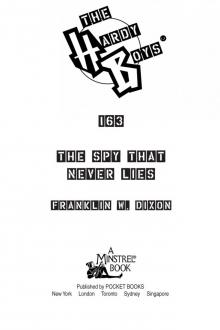 The Spy That Never Lies
The Spy That Never Lies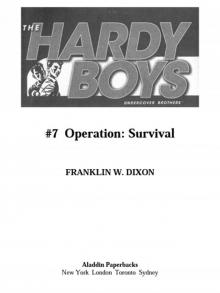 Operation: Survival
Operation: Survival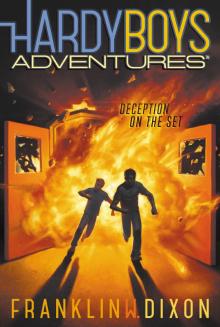 Deception on the Set
Deception on the Set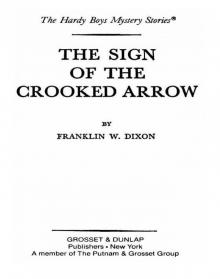 The Sign of the Crooked Arrow
The Sign of the Crooked Arrow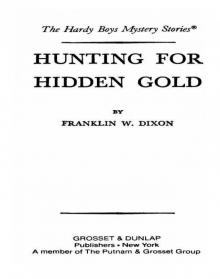 Hunting for Hidden Gold
Hunting for Hidden Gold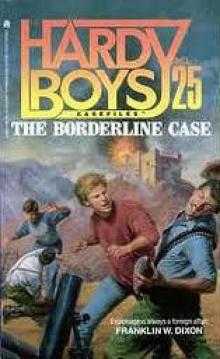 Disaster for Hire
Disaster for Hire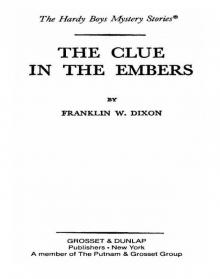 The Clue in the Embers
The Clue in the Embers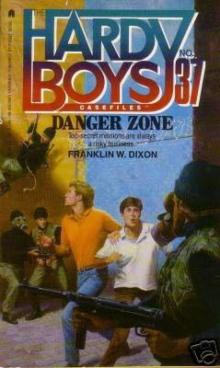 Danger Zone
Danger Zone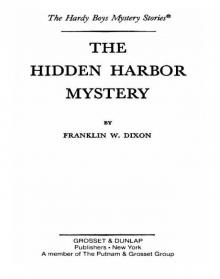 The Hidden Harbor Mystery
The Hidden Harbor Mystery Eye on Crime
Eye on Crime A Game Called Chaos
A Game Called Chaos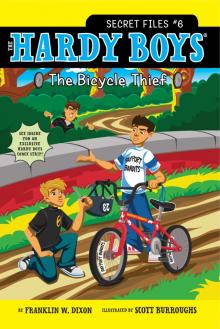 The Bicycle Thief
The Bicycle Thief The Missing Playbook
The Missing Playbook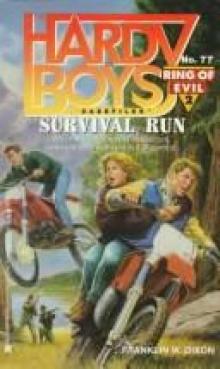 Survival Run
Survival Run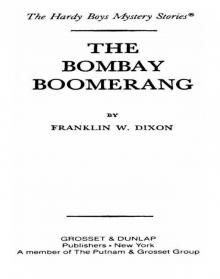 The Bombay Boomerang
The Bombay Boomerang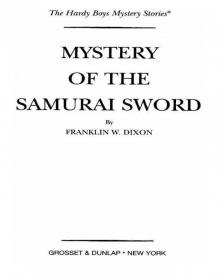 Mystery of the Samurai Sword
Mystery of the Samurai Sword Burned
Burned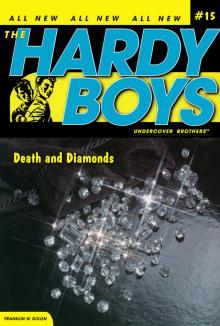 Death and Diamonds
Death and Diamonds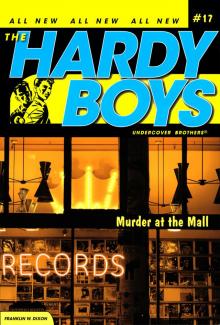 Murder at the Mall
Murder at the Mall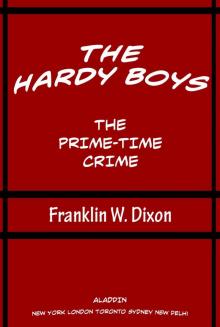 The Prime-Time Crime
The Prime-Time Crime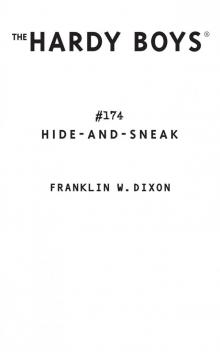 Hide-and-Sneak
Hide-and-Sneak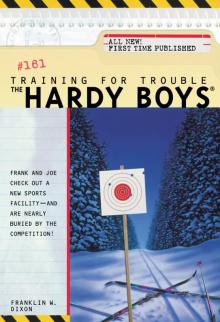 Training for Trouble
Training for Trouble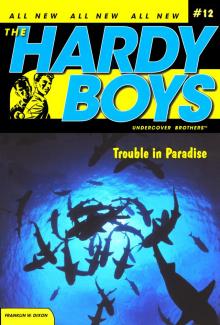 Trouble in Paradise
Trouble in Paradise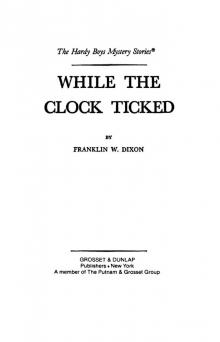 While the Clock Ticked
While the Clock Ticked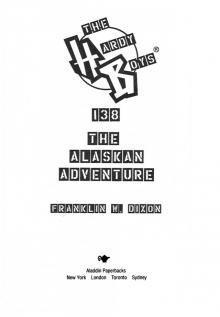 The Alaskan Adventure
The Alaskan Adventure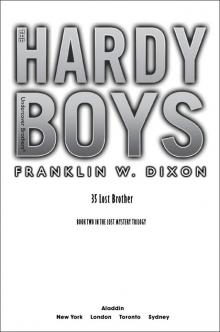 The Lost Brother
The Lost Brother Tunnel of Secrets
Tunnel of Secrets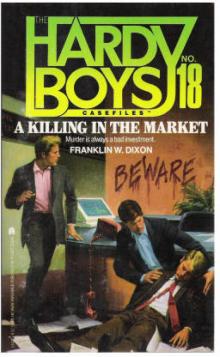 A Killing in the Market
A Killing in the Market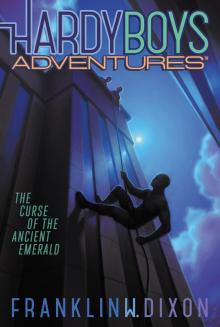 The Curse of the Ancient Emerald
The Curse of the Ancient Emerald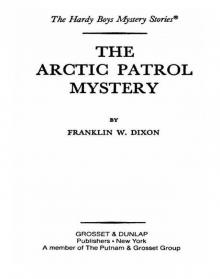 The Arctic Patrol Mystery
The Arctic Patrol Mystery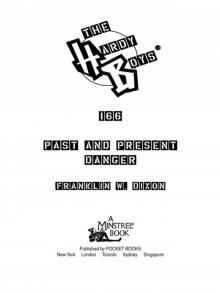 Past and Present Danger
Past and Present Danger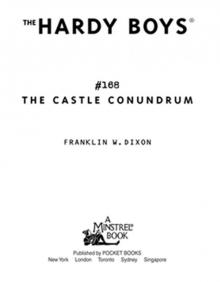 The Castle Conundrum (Hardy Boys)
The Castle Conundrum (Hardy Boys) Farming Fear
Farming Fear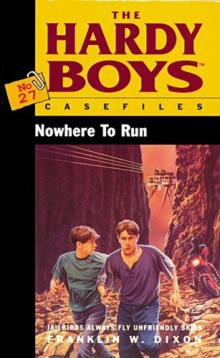 Nowhere to Run
Nowhere to Run The Secret of the Soldier's Gold
The Secret of the Soldier's Gold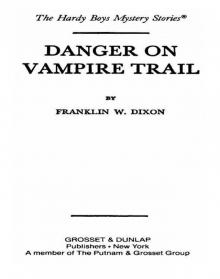 Danger on Vampire Trail
Danger on Vampire Trail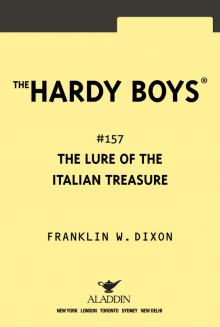 The Lure of the Italian Treasure
The Lure of the Italian Treasure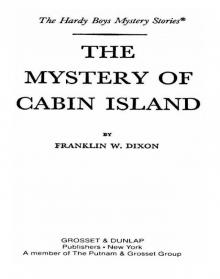 The Mystery of Cabin Island
The Mystery of Cabin Island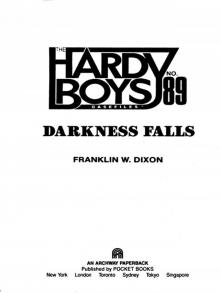 Darkness Falls
Darkness Falls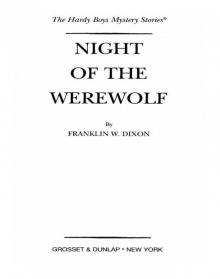 Night of the Werewolf
Night of the Werewolf Danger in the Extreme
Danger in the Extreme The Lazarus Plot
The Lazarus Plot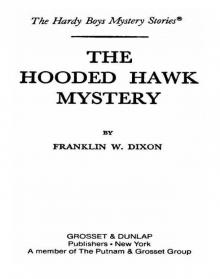 The Hooded Hawk Mystery
The Hooded Hawk Mystery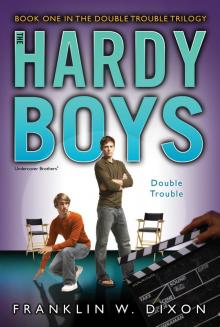 Double Trouble
Double Trouble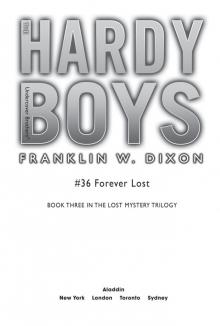 Forever Lost
Forever Lost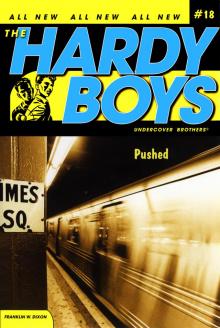 Pushed
Pushed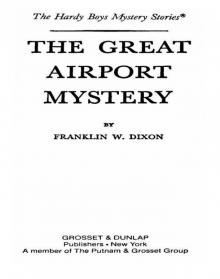 The Great Airport Mystery
The Great Airport Mystery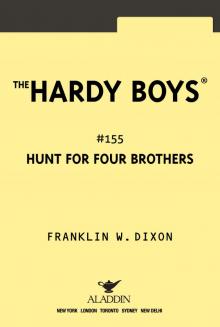 The Hunt for Four Brothers
The Hunt for Four Brothers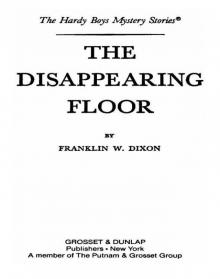 The Disappearing Floor
The Disappearing Floor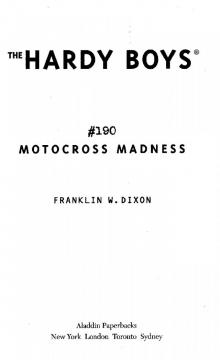 Motocross Madness
Motocross Madness Foul Play
Foul Play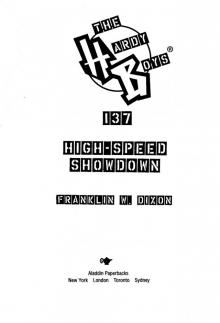 High-Speed Showdown
High-Speed Showdown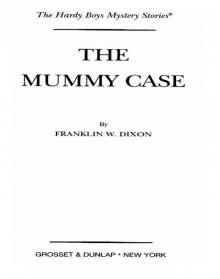 The Mummy Case
The Mummy Case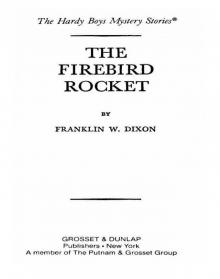 The Firebird Rocket
The Firebird Rocket Trouble in Warp Space
Trouble in Warp Space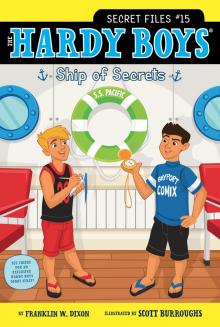 Ship of Secrets
Ship of Secrets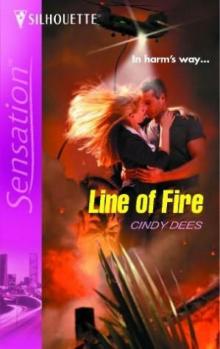 Line of Fire
Line of Fire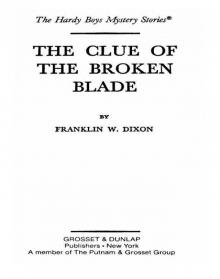 The Clue of the Broken Blade
The Clue of the Broken Blade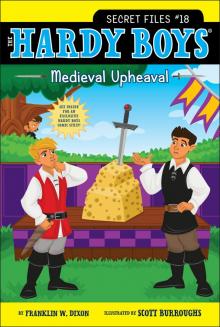 Medieval Upheaval
Medieval Upheaval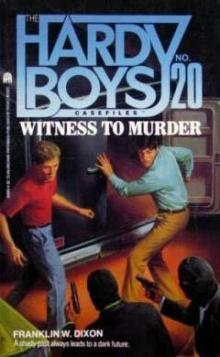 Witness to Murder
Witness to Murder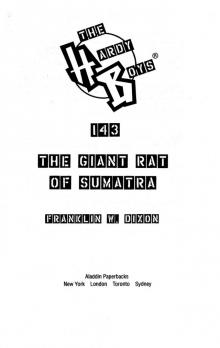 The Giant Rat of Sumatra
The Giant Rat of Sumatra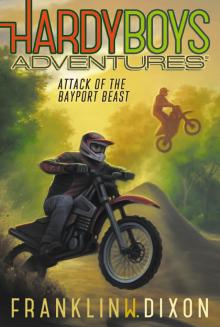 Attack of the Bayport Beast
Attack of the Bayport Beast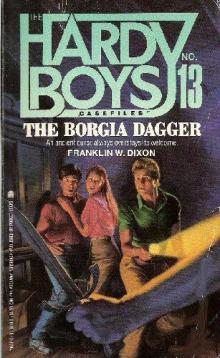 The Borgia Dagger
The Borgia Dagger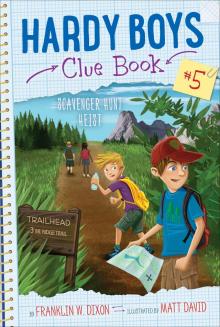 Scavenger Hunt Heist
Scavenger Hunt Heist No Way Out
No Way Out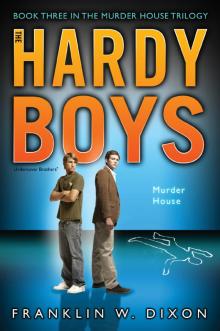 Murder House
Murder House The X-Factor
The X-Factor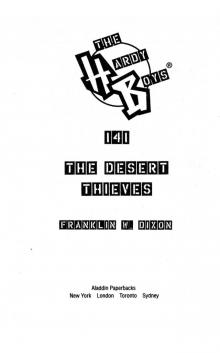 The Desert Thieves
The Desert Thieves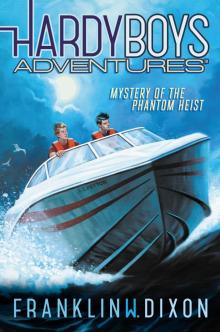 Mystery of the Phantom Heist
Mystery of the Phantom Heist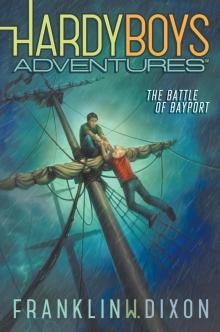 The Battle of Bayport
The Battle of Bayport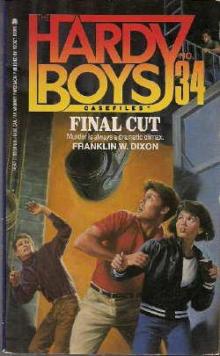 Final Cut
Final Cut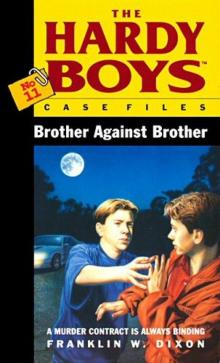 Brother Against Brother
Brother Against Brother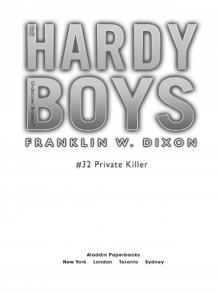 Private Killer
Private Killer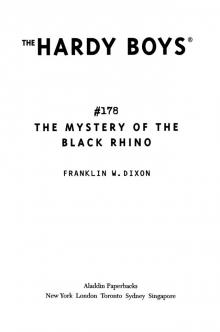 The Mystery of the Black Rhino
The Mystery of the Black Rhino Feeding Frenzy
Feeding Frenzy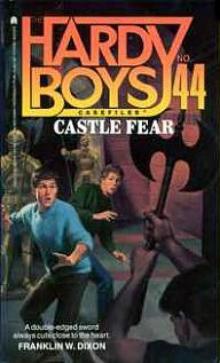 Castle Fear
Castle Fear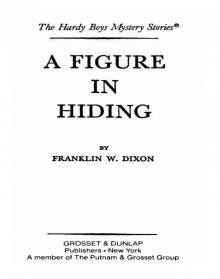 A Figure in Hiding
A Figure in Hiding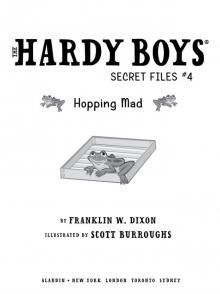 Hopping Mad
Hopping Mad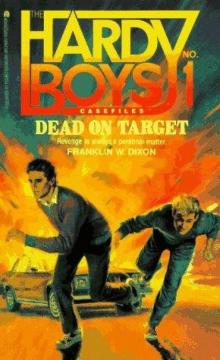 Dead on Target
Dead on Target Skin and Bones
Skin and Bones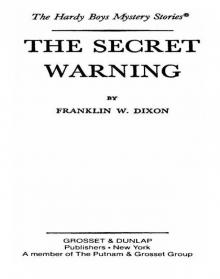 The Secret Warning
The Secret Warning Flesh and Blood
Flesh and Blood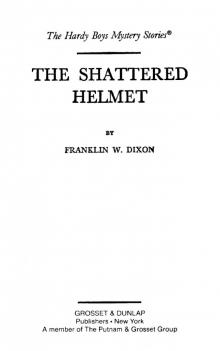 The Shattered Helmet
The Shattered Helmet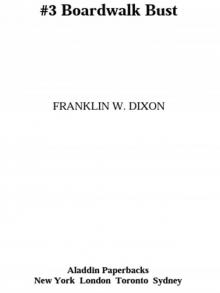 Boardwalk Bust
Boardwalk Bust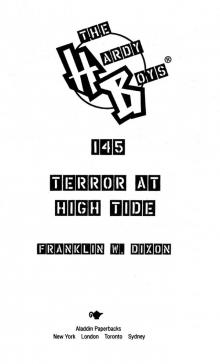 Terror at High Tide
Terror at High Tide In Plane Sight
In Plane Sight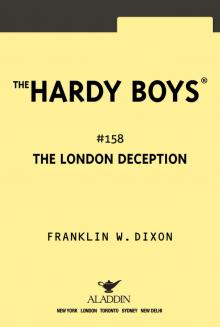 The London Deception
The London Deception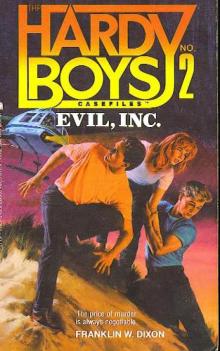 Evil, Inc.
Evil, Inc. Deprivation House
Deprivation House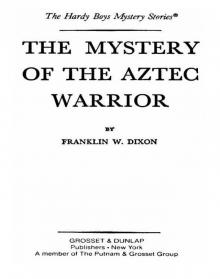 The Mystery of the Aztec Warrior
The Mystery of the Aztec Warrior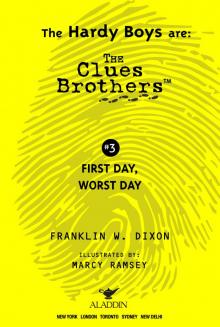 First Day, Worst Day
First Day, Worst Day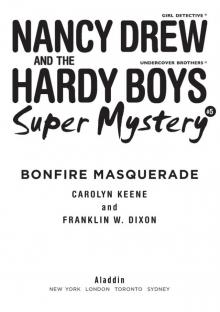 Bonfire Masquerade
Bonfire Masquerade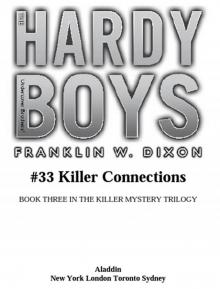 Killer Connections
Killer Connections Strategic Moves
Strategic Moves Warehouse Rumble
Warehouse Rumble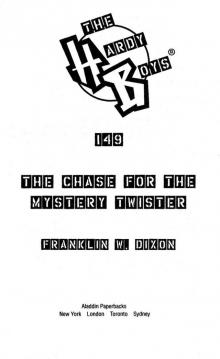 The Chase for the Mystery Twister
The Chase for the Mystery Twister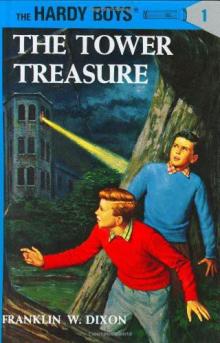 The Tower Treasure thb-1
The Tower Treasure thb-1 The Children of the Lost
The Children of the Lost The Last Laugh
The Last Laugh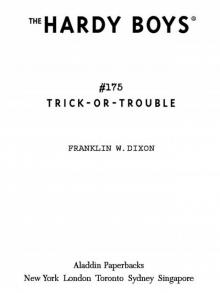 Trick-or-Trouble
Trick-or-Trouble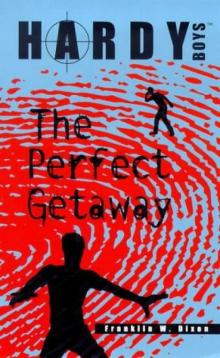 Perfect Getaway
Perfect Getaway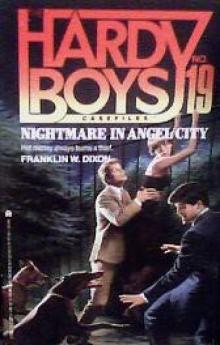 Nightmare in Angel City
Nightmare in Angel City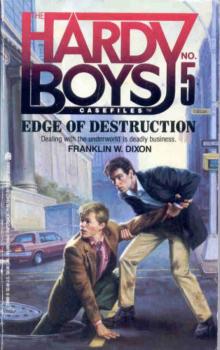 Edge of Destruction
Edge of Destruction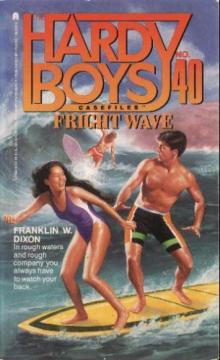 Fright Wave
Fright Wave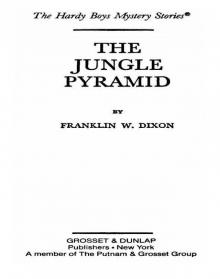 The Jungle Pyramid
The Jungle Pyramid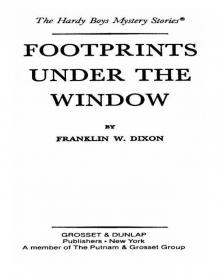 Footprints Under the Window
Footprints Under the Window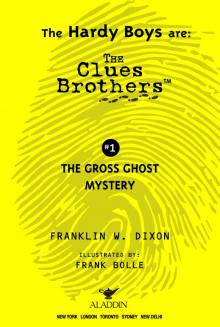 The Gross Ghost Mystery
The Gross Ghost Mystery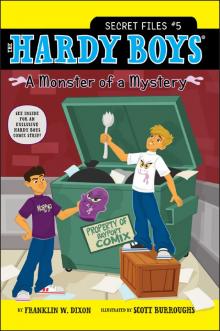 A Monster of a Mystery
A Monster of a Mystery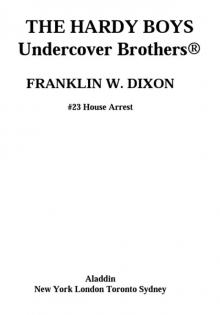 House Arrest
House Arrest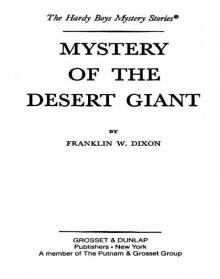 Mystery of the Desert Giant
Mystery of the Desert Giant Talent Show Tricks
Talent Show Tricks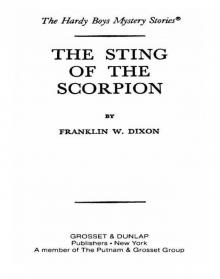 The Sting of the Scorpion
The Sting of the Scorpion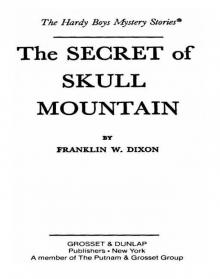 The Secret of Skull Mountain
The Secret of Skull Mountain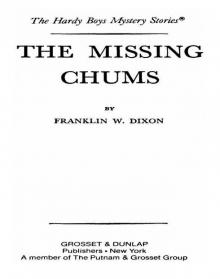 The Missing Chums
The Missing Chums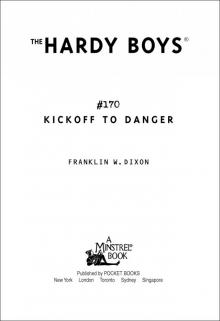 Kickoff to Danger
Kickoff to Danger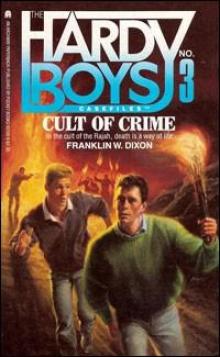 Cult of Crime
Cult of Crime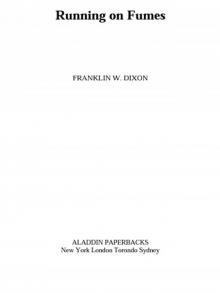 Running on Fumes
Running on Fumes Martial Law
Martial Law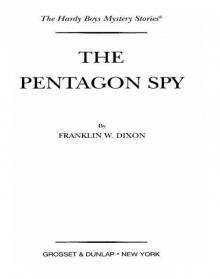 The Pentagon Spy
The Pentagon Spy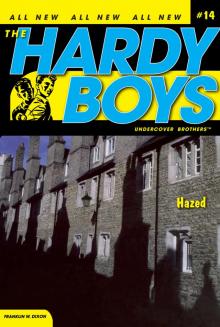 Hazed
Hazed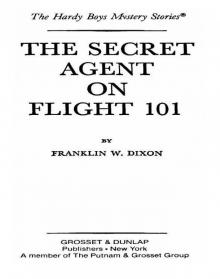 The Secret Agent on Flight 101
The Secret Agent on Flight 101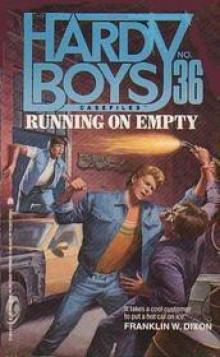 Running on Empty
Running on Empty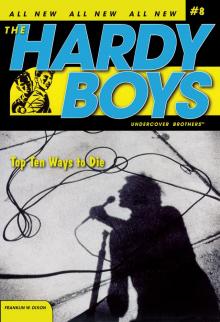 Top Ten Ways to Die
Top Ten Ways to Die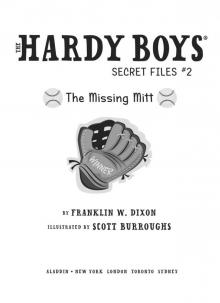 The Missing Mitt
The Missing Mitt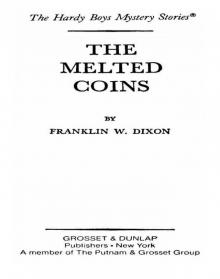 The Melted Coins
The Melted Coins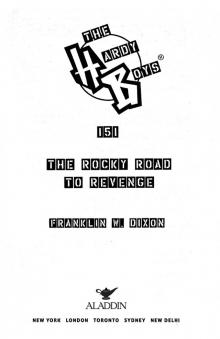 The Rocky Road to Revenge
The Rocky Road to Revenge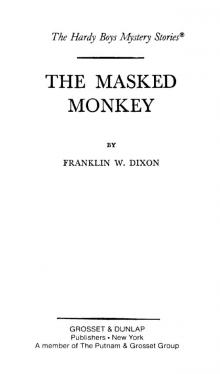 The Masked Monkey
The Masked Monkey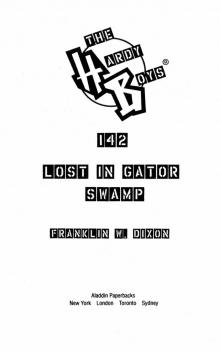 Lost in Gator Swamp
Lost in Gator Swamp Extreme Danger
Extreme Danger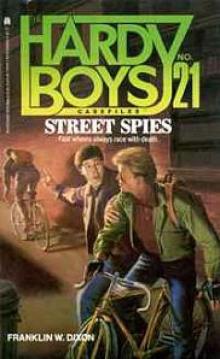 Street Spies
Street Spies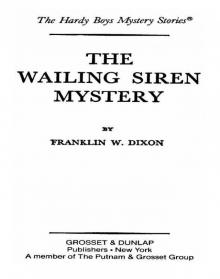 The Wailing Siren Mystery
The Wailing Siren Mystery The Dangerous Transmission
The Dangerous Transmission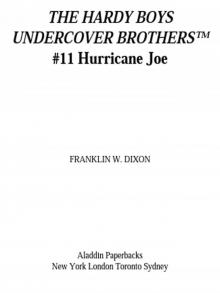 Hurricane Joe
Hurricane Joe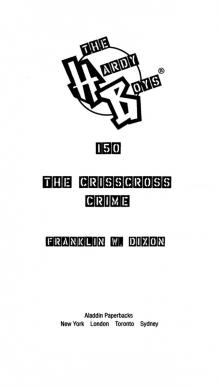 The Crisscross Crime
The Crisscross Crime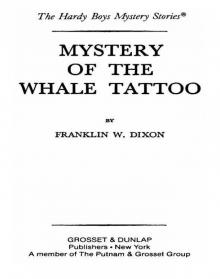 Mystery of the Whale Tattoo
Mystery of the Whale Tattoo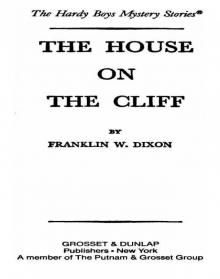 The House on the Cliff
The House on the Cliff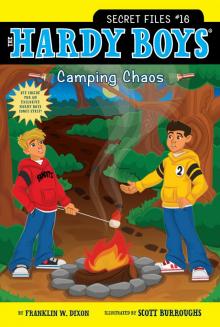 Camping Chaos
Camping Chaos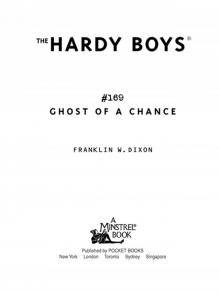 Ghost of a Chance
Ghost of a Chance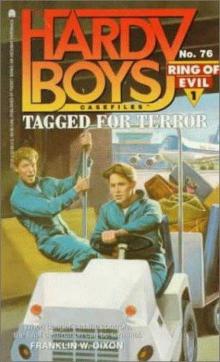 Tagged for Terror
Tagged for Terror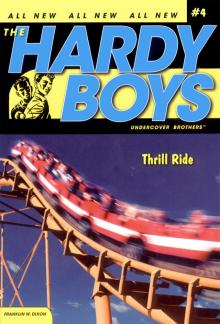 Thrill Ride
Thrill Ride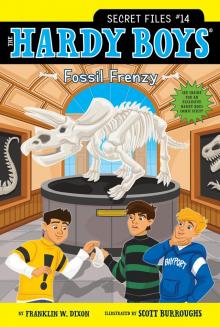 Fossil Frenzy
Fossil Frenzy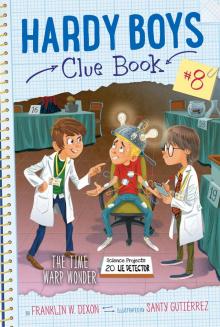 The Time Warp Wonder
The Time Warp Wonder Ghost Stories
Ghost Stories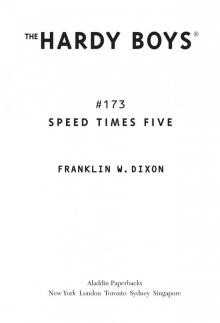 Speed Times Five
Speed Times Five What Happened at Midnight
What Happened at Midnight Three-Ring Terror
Three-Ring Terror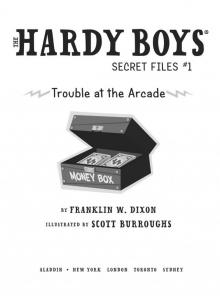 Trouble at the Arcade
Trouble at the Arcade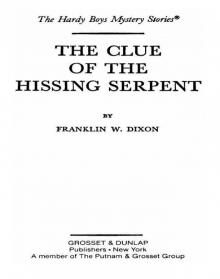 The Clue of the Hissing Serpent
The Clue of the Hissing Serpent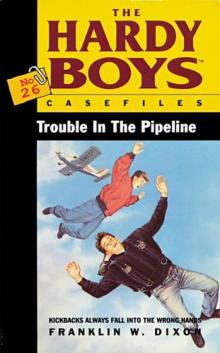 Trouble in the Pipeline
Trouble in the Pipeline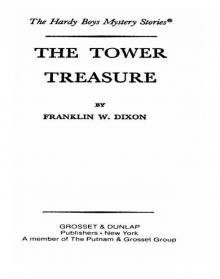 The Tower Treasure
The Tower Treasure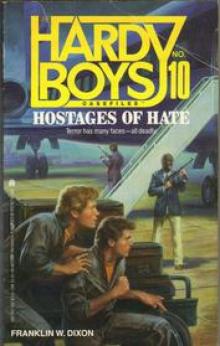 Hostages of Hate
Hostages of Hate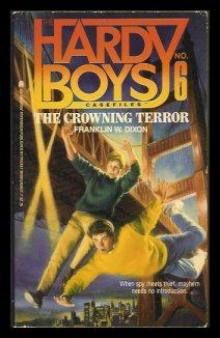 The Crowning Terror
The Crowning Terror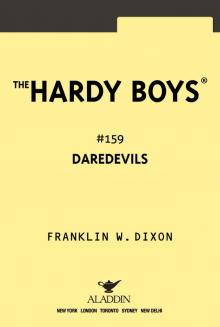 Daredevils
Daredevils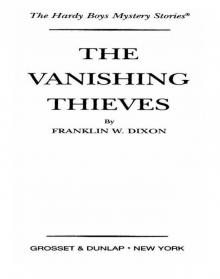 The Vanishing Thieves
The Vanishing Thieves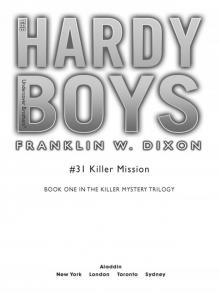 Killer Mission
Killer Mission The Mark of the Blue Tattoo
The Mark of the Blue Tattoo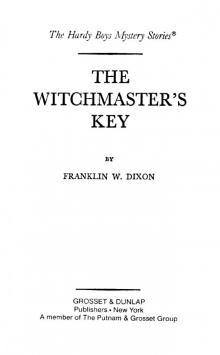 The Witchmaster's Key
The Witchmaster's Key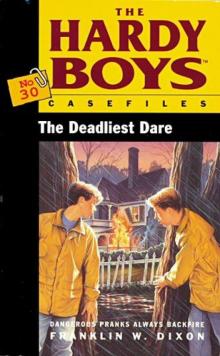 The Deadliest Dare
The Deadliest Dare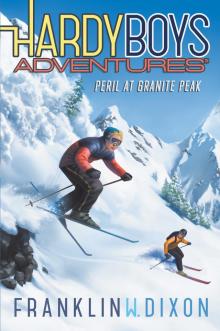 Peril at Granite Peak
Peril at Granite Peak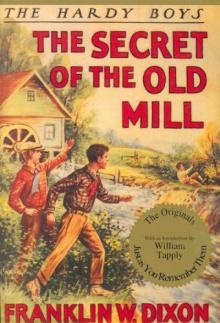 The Secret Of The Old Mill thb-3
The Secret Of The Old Mill thb-3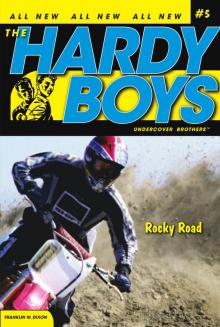 Rocky Road
Rocky Road The Demolition Mission
The Demolition Mission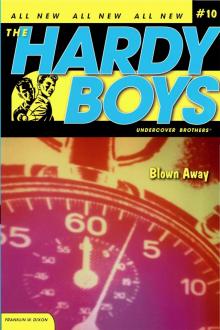 Blown Away
Blown Away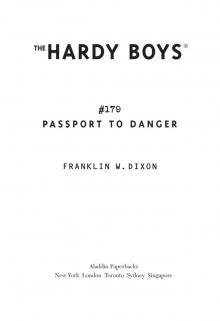 Passport to Danger
Passport to Danger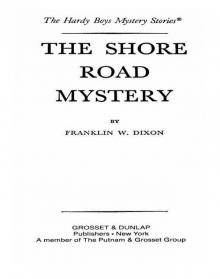 The Shore Road Mystery
The Shore Road Mystery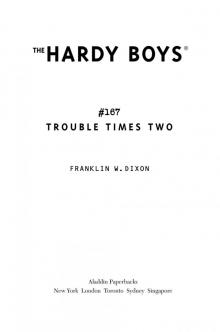 Trouble Times Two
Trouble Times Two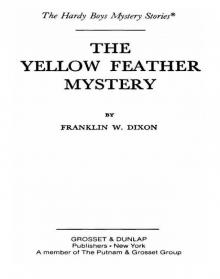 The Yellow Feather Mystery
The Yellow Feather Mystery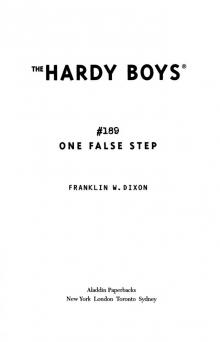 One False Step
One False Step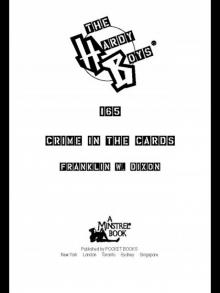 Crime in the Cards
Crime in the Cards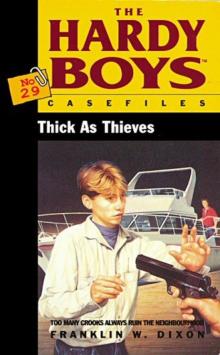 Thick as Thieves
Thick as Thieves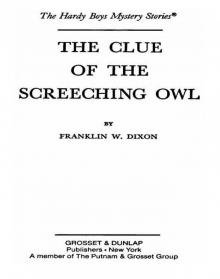 The Clue of the Screeching Owl
The Clue of the Screeching Owl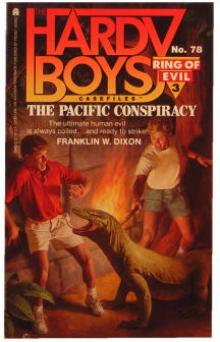 The Pacific Conspiracy
The Pacific Conspiracy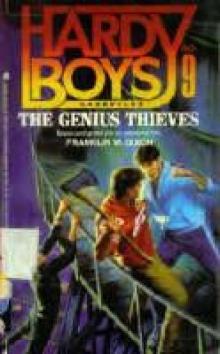 The Genius Thieves
The Genius Thieves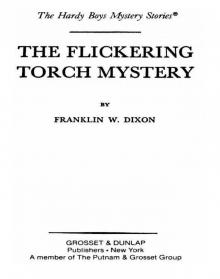 The Flickering Torch Mystery
The Flickering Torch Mystery Into Thin Air
Into Thin Air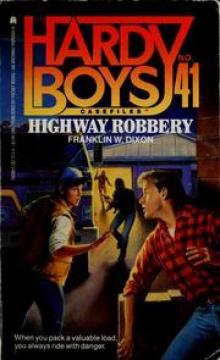 Highway Robbery
Highway Robbery Deadfall
Deadfall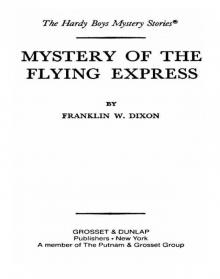 Mystery of the Flying Express
Mystery of the Flying Express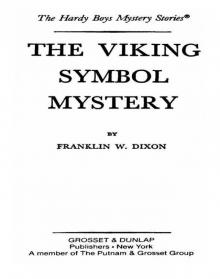 The Viking Symbol Mystery
The Viking Symbol Mystery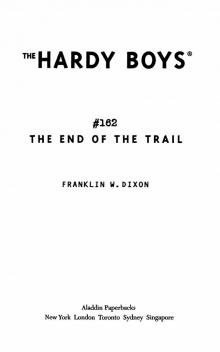 The End of the Trail
The End of the Trail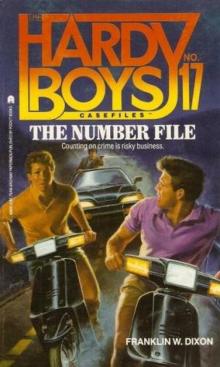 The Number File
The Number File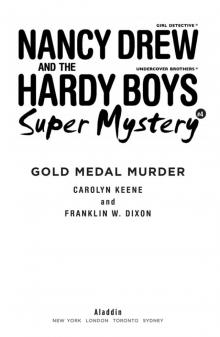 Gold Medal Murder
Gold Medal Murder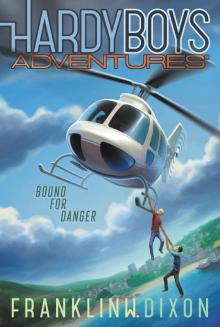 Bound for Danger
Bound for Danger Collision Course
Collision Course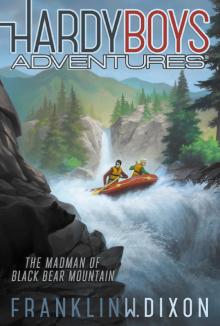 The Madman of Black Bear Mountain
The Madman of Black Bear Mountain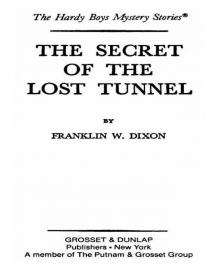 The Secret of the Lost Tunnel
The Secret of the Lost Tunnel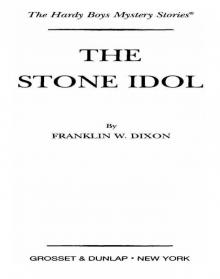 The Stone Idol
The Stone Idol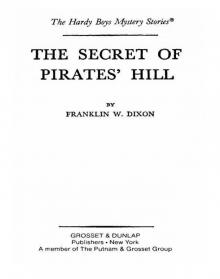 The Secret of Pirates' Hill
The Secret of Pirates' Hill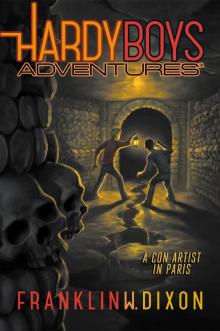 A Con Artist in Paris
A Con Artist in Paris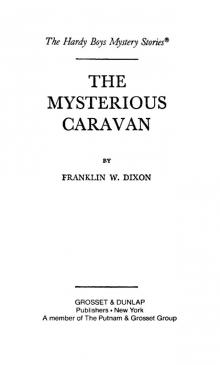 The Mysterious Caravan
The Mysterious Caravan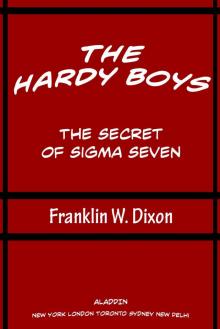 The Secret of Sigma Seven
The Secret of Sigma Seven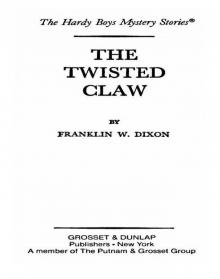 The Twisted Claw
The Twisted Claw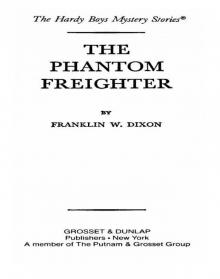 The Phantom Freighter
The Phantom Freighter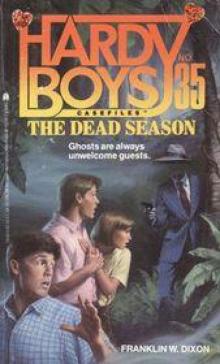 The Dead Season
The Dead Season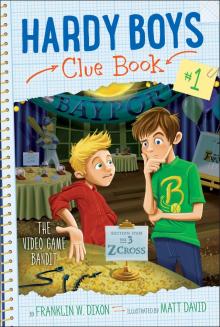 The Video Game Bandit
The Video Game Bandit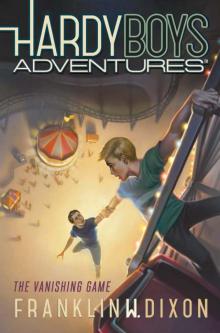 The Vanishing Game
The Vanishing Game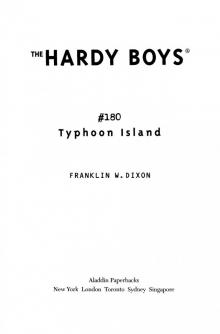 Typhoon Island
Typhoon Island